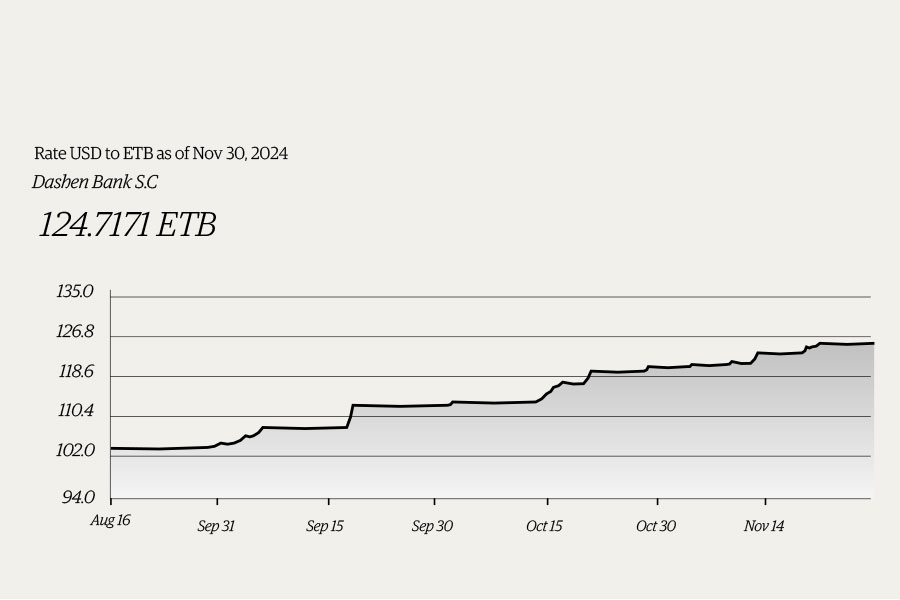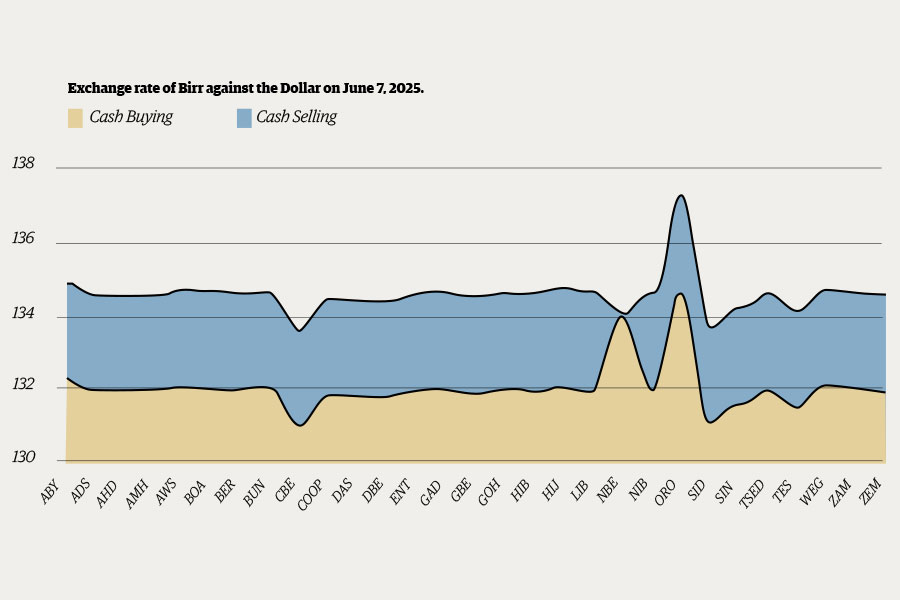
Fortune News | Oct 18,2025
The National Bank of Ethiopia (NBE), which is very concerned with the depletion of the liquidity reserve of commercial banks, has tightened its grip on the industry in an attempt to resolve the ongoing liquidity crisis.
The regulatory bank has required all of the commercial banks to submit a complete list of their outstanding loan portfolios that include the name of the borrower, the value of the loan and the maturity period. The NBE also compelled the financial institutions to file their cash flow statements until June 30 of this year along with the list of the loans they have approved but not disbursed.
Beginning last week, the regulatory bank sent a letter attached with a form to the banks requesting to submit complete data on their cash flows and loan portfolios. The banks were also given until the end of last week as a deadline to file the data.
Before dispatching the letter, central bank governor Yinager Dessie (PhD) held a meeting with the board chairpersons of all of the commercial banks to discuss the concerning liquidity crises in the industry.
During the meeting, the governor, who was very serious and straight forward, told the board of directors that the central bank would take stringent actions and conduct regular follow-ups to rectify the problem.
Yinager directed the banks to employ a system that registers uncleared cheques. He also warned them to clear cheques in a timely manner. If they fail to do so, the central bank will clear the cheques of clients but continue to hold the banks accountable for the uncleared cheques.
Currently, cheques worth close to six billion Birr are pending between banks, while most of the banks mention system failure as a reason for not processing the cheques while being cash-strapped. Some banks, including the Commercial Bank of Ethiopia (CBE), limited the maximum money a depositor can withdraw to 5,000 Br in Meqelle and Dessie.
The governor also warned the banks, including CBE, to follow the law, according to the attendees of the meeting. The governor also alerted the guardians of the banks that the regulator would take measures against those that fail to operate in line with the procedure.
A former regulator who commented under the condition of anonymity, says that the issue has multidimensional problems ranging from policy issues to loose regulation from the central bank coupled with weak credit management at the banks.
“This has never been seen in the past 20 years,” said the expert, "and it is severe and risky."
Most of the banks were disbursing long-term loans while mobilising short-term resources, according to the former regulator, adding that the 27pc mandatory NBE Bill purchase has significantly drained the banks over the past couple of years.
In the past year, the growth of deposit mobilisation and loan disbursement was not balanced. Borrowing has grown by 40pc, while resource mobilisation was growing by only 20pc. Since launching the NBE bills in 2011, the central bank sold 26.2 billion Br worth of them to private banks.
NBE requires banks to maintain liquid assets of no less than 15pc of their net current liabilities. Last fiscal year, the banks' liquidity ratio stood at 17.2pc, registering a percentage point growth from the preceding year. Their average loan-to-deposit ratio showed a three percentage point increase last fiscal year, reaching 58.7pc.
The central bank has identified nine banks for having a liquidity ratio below the minimum requirement and gave them last Friday, January 31, 2020, as a deadline to adjust the rate. Bank of Abyssinia, United Bank and Dashen Bank are among the banks that were included in the red list. Fortunewas able to confirm that Bank of Abyssinia fixed the rate before the deadline.
Before calling the board chairpersons, the governor also held a meeting with presidents of the banks to discuss the issue. It also availed 14.5 billion Br of loans to the banks at a competitive interest rate in two rounds. The two loans were provided to the banks with less than a month interval.
A board chairperson at one of the mid-sized banks says that the current move by the central bank is too late, saying that the problem did not suddenly appear. Rather, it grew over the past couple of years fueled by multiple factors. The board director mentioned CBE's experience three years ago in availing two billion dollars of foreign currency to businesses.
During the time, CBE required those who applied for the foreign currency to deposit 100pc of the value they requested to open letters of credit.
“To fulfill this requirement, most of the businesses withdrew their money from the private banks,” said the veteran banker. "That was one of the biggest incidents that seriously threatened the banks' liquidity."
Declining revenues from the export of coffee is also another reason mentioned by this senior bank official for the cash-strapped nature of the current environment, which challenges almost all of the banks.
Due to poor export performance, many coffee exporters that previously took loans from the banks cannot service their loans. And a directive from the central bank followed directing the banks not to auction off the properties of the exporters to recover their loans. Another new law forcing banks to reschedule loans six times instead of three arrived in 2019.
"It's tough to rectify these deep-rooted problems that worsened through time within a short period," he commented.
Eyob G. Eyesus, vice governor of the central bank in charge of corporate services, declined to comment on the issue.
PUBLISHED ON
[ VOL
, NO
]

Fortune News | Oct 18,2025

Commentaries | Feb 15,2020

Money Market Watch | Dec 01,2024

Fortune News | Oct 27, 2024

Money Market Watch | Jun 08,2025

Dec 22 , 2024 . By TIZITA SHEWAFERAW
Charged with transforming colossal state-owned enterprises into modern and competitiv...

Aug 18 , 2024 . By AKSAH ITALO
Although predictable Yonas Zerihun's job in the ride-hailing service is not immune to...

Jul 28 , 2024 . By TIZITA SHEWAFERAW
Unhabitual, perhaps too many, Samuel Gebreyohannes, 38, used to occasionally enjoy a couple of beers at breakfast. However, he recently swit...

Jul 13 , 2024 . By AKSAH ITALO
Investors who rely on tractors, trucks, and field vehicles for commuting, transporting commodities, and f...

Nov 1 , 2025
The National Bank of Ethiopia (NBE) issued a statement two weeks ago that appeared to...

Oct 25 , 2025
The regulatory machinery is on overdrive. In only two years, no fewer than 35 new pro...

Oct 18 , 2025
The political establishment, notably the ruling party and its top brass, has become p...

Oct 11 , 2025
Ladislas Farago, a roving Associated Press (AP) correspondent, arrived in Ethiopia in...